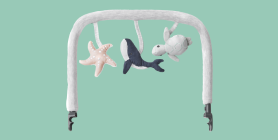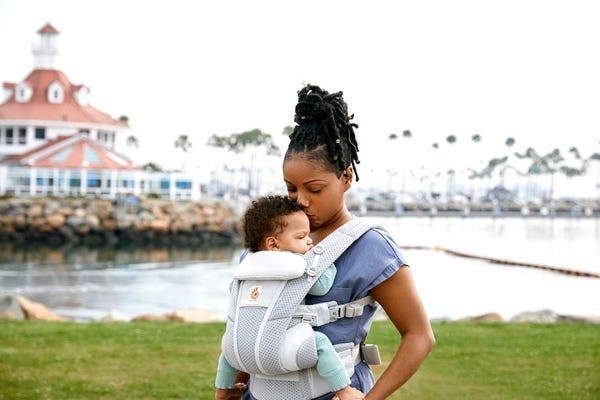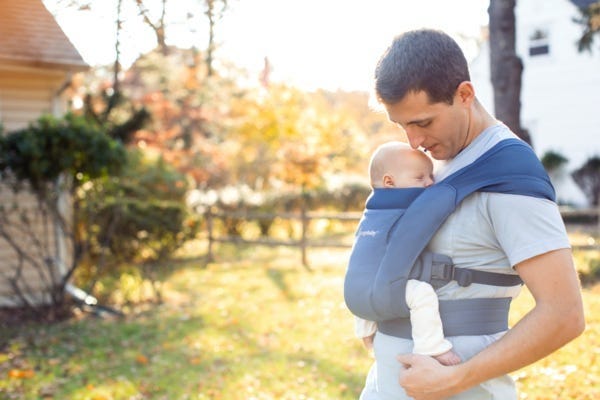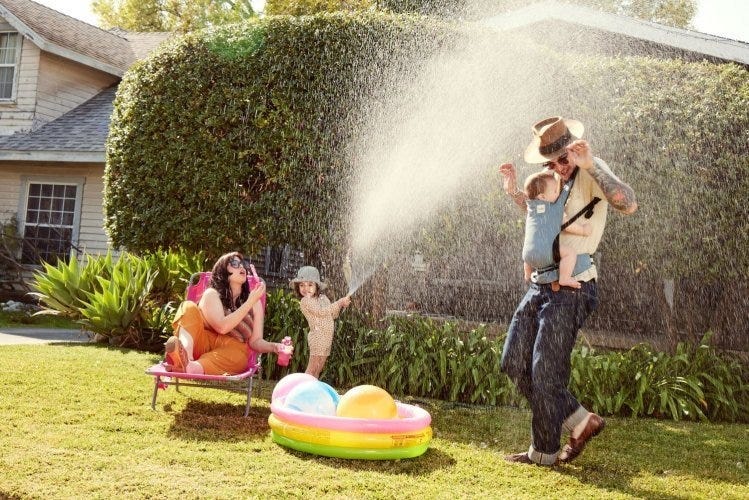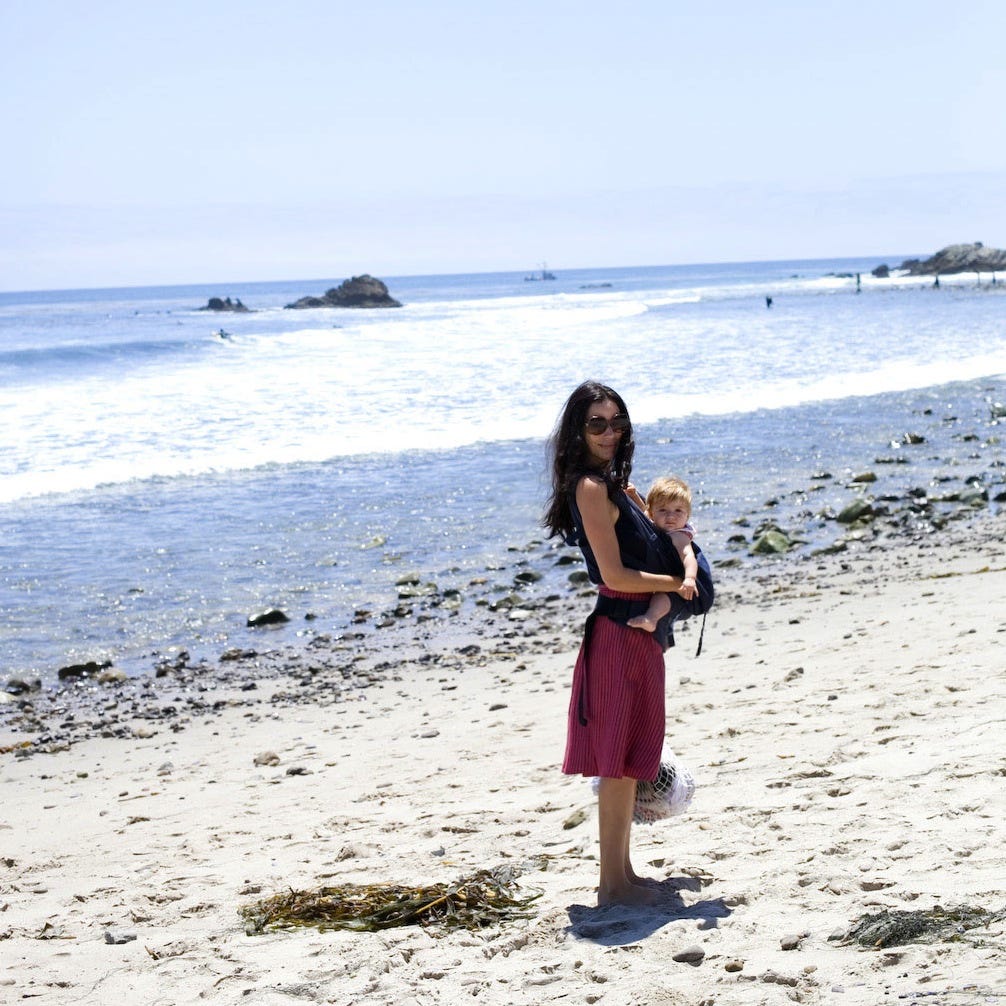
For parents who carry their little one in a sling or a carrier, sunscreen is not a choice - it’s a must. Although the sleeping hood on the Ergobaby baby carrier has 50+ UPF protection, frequent babywearing parents should still take care to properly protect their little peanuts from sunburn.
Don’t let the thought of sun exposure dissuade you from wearing your baby as much as possible. Holding your baby in a carrier provides security for babies as they experience the familiar sensations they had in the womb like hearing your voice, feeling your heartbeat and your rhythmic breathing. Many moms also like being able to quickly respond to their baby’s cries and the benefits of increased eye-to-eye contact when carrying baby so closely. Sunshine and outdoor time are wonderful things for young children, but too much of a good thing can have adverse effects on skin of any age. As much as 80% of lifetime sun exposure occurs before the age of 18. A great deal of the UV exposure we receive comes from reflected light off the ground and other objects. This means a hat or canopy over a baby may not be enough protection. There are two types of UV rays that cause damage to our skin. UVA rays are the ones that cause aging and UVB rays are the ones that cause skin to burn. Using a broad-spectrum sunscreen means you are protecting your skin from both of these types of rays. Choose a lightweight and non-greasy product with ingredients like organic green tea to keep skin cool and offset and prevent UV damage. The safest choice is sun protection with ingredients that add value to the human body by providing extra nutrients, vitamins and minerals and are derived from plant sources. Know your ingredient labels and avoid artificial fragrances, parabens, phthalates, phenoxyethanol, petroleum byproducts or other harsh chemicals. These can be present even in baby products that say “all natural” on them. You’ll also want to steer clear of synthetic chemicals with unrecognizable names like octinoxate. Chemical-based sunscreens work by absorbing into the skin and should be avoided by everyone, especially babies. Not only do these chemicals force the baby’s organs to work extra hard to eliminate them, many of them are estrogen mimickers that may cause hormonal developmental problems in young children. Opt for a block that uses surface floating minerals like zinc or titanium as opposed to those absorbed by the skin. It is also okay to use sunscreen just on baby’s exposed parts like the face and backs of the hands. Sunscreen should be used on babies any time they are exposed to the sun. The American Academy of Pediatrics recommends this, even for babies under 6 months. Developing a daily routine to protect your baby from the sun’s damaging ultraviolet rays can reduce the risk of developing skin cancer later in life and prevent the possibility of getting a painful sunburn. Pain is the body’s message to us that something is wrong. Sunburn and sun overexposure significantly reduce the body’s immune system. Frequent reapplication is always crucial when spending extended time outdoors. Reapply sunscreen at least every two hours. Any contact with water, clothing, drool, or feedings can reduce the amount of protection your baby is getting from sunscreen. photo credit: Bonnie Tsang Even though Summer is almost over, it's still important to use sunscreen year-round on baby's delicate skin when out and about babywearing!
Emotional Benefits of Getting Outside
Spending time in nature with your baby can strengthen the bond between you. The simple act of holding your baby close, feeling their warmth, and sharing new experiences together can create strong emotional connections. It’s also a wonderful way to reduce stress and improve your mood. When my littles were extra fussy, I’d take a walk around the neighborhood. Even though I don't live in an area with trails and surrounded by nature, simply behind outside changed everything. A little vitamin D does wonders!
Cognitive Development
Nature is a sensory wonderland for babies. The different sights, sounds, and smells can stimulate your baby’s senses and promote cognitive development. Watching leaves rustle, hearing birds chirp, and feeling the texture of a tree bark can all contribute to their learning and development.
All About Baby Carriers for Nature Adventures
Choosing the Right Baby Carrier
When it comes to selecting the best baby carrier for summer adventures, there are several options to consider.
Types of Baby Carriers:
- Wraps: Perfect for newborns, providing a snug and secure fit.
- Slings: Ideal for quick and easy use, offering good ventilation.
- Soft Structured Carriers: Versatile and comfortable for both parent and baby, suitable for longer trips.
Factors to Consider:
- Baby’s Age and Weight: Ensure the carrier is appropriate for your baby’s size and weight. For example, Ergobaby’s Embrace Newborn Carrier is perfect for the fourth trimester where baby is small and you’re looking for an easy way to stay close. As they grow, you’ll want to upgrade to an all-position carrier that’s meant for growing babies.
- Parent’s Comfort and Ergonomics: Look for carriers with padded shoulder straps and lumbar support if you’re planning on longer outings.
- Ease of Use: Choose a carrier that is easy to put on and take off.
- Climate and Breathability: Opt for carriers made of breathable fabrics to keep you and your baby cool in hot weather.
Safety Tips:
- Proper Positioning: Ensure your baby is seated correctly, with their legs in an "M" position and their head should be close enough to kiss.
- Checking for Wear and Tear: Regularly inspect your carrier for any signs of damage.
- Ensuring Adequate Support: Make sure the carrier provides proper support for your baby’s head and neck.
Exploring Nature with a Baby Carrier
Ideal Spots for a Nature Walk with Baby
- Parks and Gardens: Great for leisurely walks and picnics.
- Nature Trails and Forests: Perfect for more adventurous outings.
- Beaches and Lakesides: Wonderful for enjoying the water and sand, with the right carrier.
Activity Ideas
- Hiking: Enjoy a scenic hike with a hiking baby carrier that offers support and storage.
- Bird Watching: Use your carrier to keep your baby close while you explore and observe wildlife.
- Picnics: A carrier can free up your hands, making it easier to carry picnic supplies.
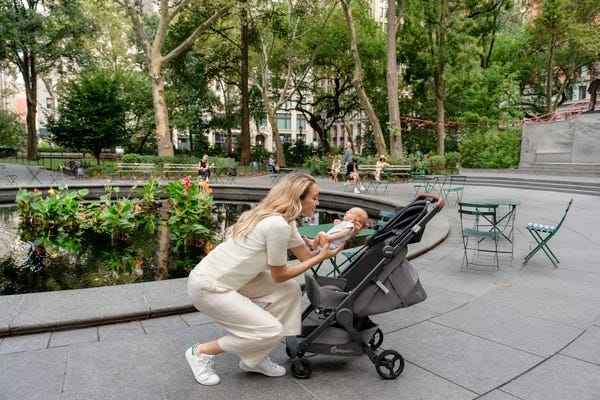

Advantages of Using Strollers for Nature Adventures
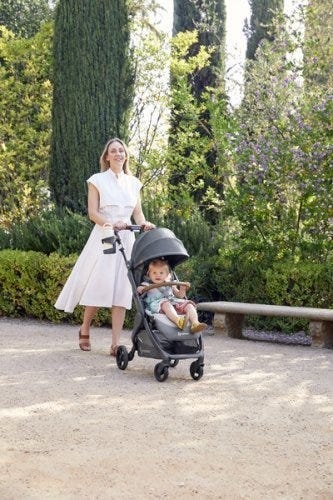

While baby carriers are fantastic for mobility and closeness, depending on the adventure of choice you might want to be a stroller along too.
There are a LOT of baby stroller options on the market. So we understand how confusing it can be to choose the one that’s right for your family. Not only are there a variety of brands, but a variety of strollers that serve different purposes.
There are a few types of strollers on the market:
- Full-sized stroller: This is typically the stroller parents thing of buying for all its versatility.
- Lightweight or umbrella stroller:These compact strollers are perfect for on-the-go adventures.
- Jogging stroller: Designed for parents who want to combine fitness with outdoor adventures.
- Double stroller: Designed for parents with multiple kids, especially twins.
- Car seat carrier: These strollers connect to a specific car seat. We don't typically recommend these as they can be unsafe for baby and uncomfortable for parents who are pushing.
Learn more about the types of strollers and which one would be best for you.
Benefits of Bringing a Stroller
- Storage Space for Gear: Ample room for carrying all your essentials like a diaper bag, beach toys and more.
- Shade and Weather Protection: Built-in canopies to shield your baby from the sun when they are lounging.
- Options: If you have more than one kid, you can stroll with one and carry the other. Or, if you’re getting warm or your little one is getting fussy, you can switch up their position from stroller to carrier or vice versa.
Safety Tips for Strollers
- Ensure your stroller is in good working condition. Make sure buckles are still buckling and that there are no rips or holes that could compromise your baby’s safety.
- Use sunshades or bug nets to protect your little one’s skin.
- Securing the baby properly: always buckle up your baby for safety even if you think they are old enough to go without the buckle.
Combining Baby Carriers and Strollers
For the ultimate flexibility, consider using both a baby carrier and a stroller on your outings.
Combining both options allows you to adapt to different situations. Use the carrier for more rugged trails and switch to the stroller for smoother paths or when your baby needs a nap.
Transition Tips
- Smooth Transitions: Plan stops where you can easily switch from carrier to stroller.
- Pack Light: Only bring essentials to make transitions easier.
Tips for a Successful Adventure
Planning Ahead
- Route Planning: Choose baby-friendly trails and parks. Check local mom groups or outdoor groups and get recommendations for the best outings for kids.
- Check Weather Conditions: Avoid extreme heat or unpredictable weather. Even with our most breathable carriers, when it’s hot, it’s hot. And having two bodies against each other in the heat will be naturally hot and sticky already.
- Packing Checklist: Include diapers, snacks, water, sunscreen, and a first-aid kit. These all-position carriers have storage pockets where you can fit some of the items easily!
- Stay Hydrated and Nourished: Pack healthy snacks to keep energy levels up and bring plenty of water for both you and baby.
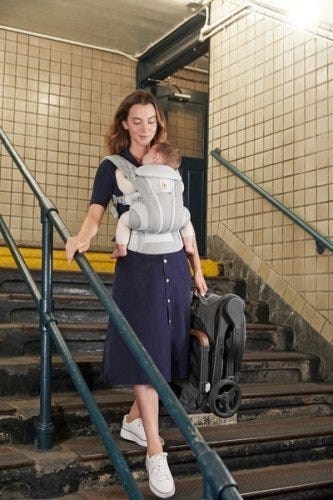

Summer adventures with your baby are a wonderful way to create lasting memories and enjoy the beauty of nature together. From baby carriers to strollers, Ergobaby products are designed to provide comfort and ease for both you and your little one. So, gear up, get outside, and explore the world with your baby by your side.
Ready to embark on your own summer adventures? Check out Ergobaby’s range of baby carriers and strollers to find the perfect match for your family’s needs. Visit our website today and start planning your next outdoor excursion!















